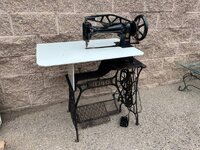I think sailrite is a good recommendation for a portable machine if you are going to do a lot of stuff. The clones on ebay work great also, I own one. If it is a one-off project, take it to a shoe shop as also suggested. If you want to get a more useful machine, look for an old Singer model 29 "patch" machine. It is a walking foot, long cylinder arm machine so you can sew deep inside pack bags, boots, etc. It is primarily used in the shoe repair industry to "patch" the leather on the uppers of shoes and boots, as opposed to soles, which it will not sew. But for light to medium leather, heavy canvas or pack cloth, and 4 or 5 layers of any webbing you can find it is just the ticket, even the older treadle versions. I used a treadle version for 50 years making my own climbing/camping/tactical gear. Still have it and use it. One of its best features is the walking foot that swivels 360 degrees. This combined with the cylinder arm makes this more versatile than ANY flat bed industrial machine, and any shoe shop in town can tell you where to buy needles, parts, and or give you tips and or demonstrations on how to use one. Most have one. Many have 2 or 3 and might sell you one.
This one is currently on Ebay for $500. I have seen them on craigslist and facebook marketplace for $200 to $300. They are entirely US made of cast iron and machined steel. I would always buy local, pick up in person, and get a demonstration before you buy when buying used machines. If it is mishandled or dropped during shipping. the cast iron can break and is nearly impossible to repair correctly. As you may imagine, they are VERY heavy.
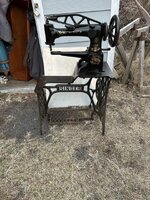
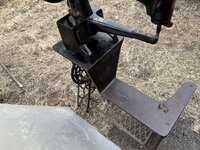
As you can see, it has plenty of room to working on big packs, rock climbing belts, and web gear of all types. I use 069 nylon thread in mine, and have rock climbed for decades on belts, and web gear made on a machine identical to the one above. I think you can go up to about T140 thread size, but not much bigger. Nylon thread that size will last a lifetime if it is not abraded. Mine machine is over 100 years old, and did daily heavy service before, during, and after the great depression in my grandfather's shoe shop when everyone repaired everything because noone could buy new, then in my father's shoe shop in the 1940's and 50's, and was given to me when I started leatherworking as a hobby in the 1970's. Mine still runs like a swiss watch and has never needed a repair in 50 years. It will sew 1/8 leather, like belts, with ease, and up to 1/4 leather if you feed carefully and turn the hand wheel by hand, It will sew through 4 or 5 layers of heavy nylon webbing at speed. It has 2 speeds which are changed by changing the drive belt between 2 sets of pulleys. Originally used a round leather drive belt which can still be bought, or I have used nylon paracord as a belt on mine for decades. (the one pictured from flea bay above is missing the belt.) The machines also have a bobbin winder and a wax pot for running the thread through a cake of bees wax (commonly done before synthetic threads were invented to make the thread sew easier and last longer, but wax is no longer needed with synthetic thread.)
For your described use, this would be my first choice and happens to be very reasonable cost for original Singers. You just have to find one, but since they are virtually indestructible (unless you leave them outside to rust for years or drop them off a truck) you can still find them today.
New clones sell for about $3500 at Tandy. I still use my grandfather's old treadle machine which still sews just as well as the modern electric machines even after 100 years of hard use. To give you a little context about my knowledge and experience, I own and use several modern stitching machines (Juki 441 clone) that will sew through 3/4" thick leather at speed (and sew through your finger if you are not careful), industrial Singer 31 flatbed machines, the Sailrite portable type machines, the Singer 29-4 treadle machine, heavy duty household sewing machines, all the way down to horizontal needle Bonis machines for sewing fine furs and lamb skin gloves. So I own and use a wide variety of machines old and new, for a wide variety of purposes, on a wide variety of materials, and for repairing packs and camping/climbing/tactical gear, the Singer 29 and/or clones, old or new, cannot be beat at any price.
Here is a pic of the $3500 Tandy modern clone,
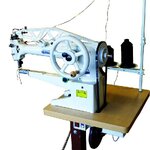
This manual (no motor) clone listed on Amazon for $900 (including round leather belt for adding motor and bobbin winder in picture). Note turn wheel is on end of machine but can be moved to front spindle as in Tandy picture above. These are least useful version since you have to turn with one hand and guide material one-handed. But these are easy to mount on a stand and motorize like the Tandy version above. Notice the hand wheel on the version below has a drive belt grove in it. This means you can mount a motor with a small pulley wheel and run a belt to the groove on the large hand wheel, and run in this setup, the feed and stitch will run at a slow steady speed giving you maximum workpiece control for heavy or technical/precise work.
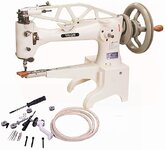
Follow this link to Amazon to see a video of the clone in action.
https://www.amazon.com/YEQIN-Leather-Patcher-Industrial-Machine/dp/B07BBKR6GQ
Notice in video he sews in a complete circle without ever turning the workpiece. You just turn the walking foot. Imagine how useful that is when repairing stitching or adding a new pocket on a pack without having to turn the pack 270 degrees while sewing. This is what makes the machine more versatile and useful than any other machine for sewing on odd-shaped items like packs, boots, purses, climbing belts, etc. You can also mount a u-shaped table around the arm and use it like a flat bed machine.
Last pic of one currently listed on craigslist in Albuquerque for $500. This one has an aluminum work table and was used for making riding chaps for last 25 years. I am tempted to drive to Albuquerque myself and buy that one just to get that table. Nice.
